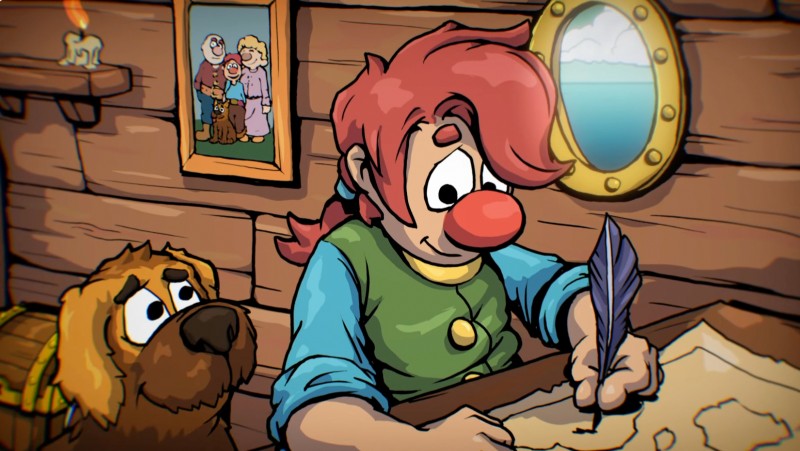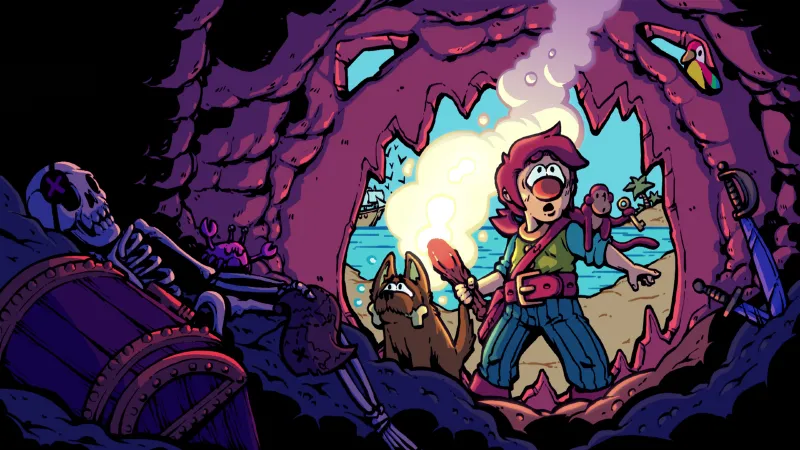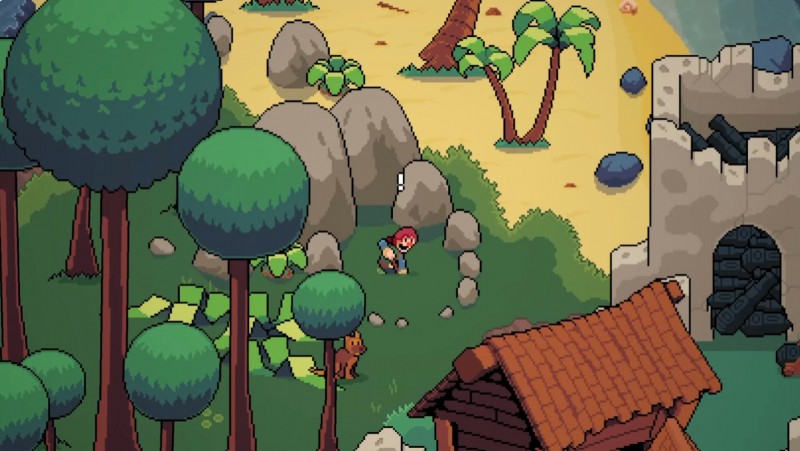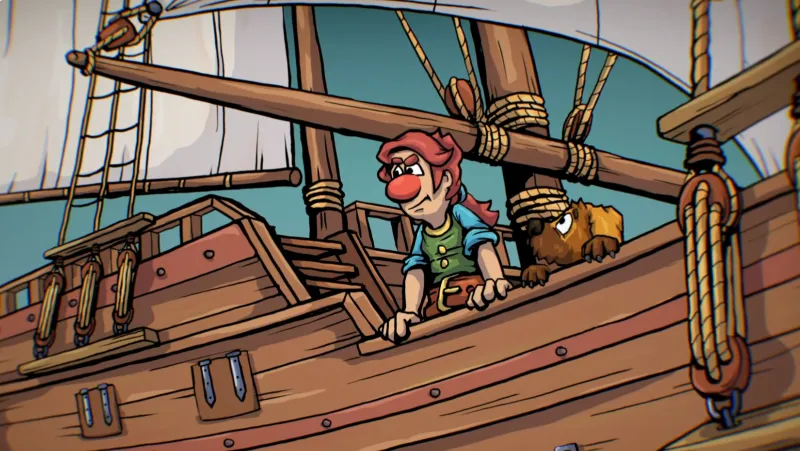
Bilkins' Folly is a throwback pirate adventure game that's out today on PlayStation 5, PlayStation 4, Switch, and PC. It's a game that's been on my radar since earlier this year: both because I love most anything related to pirates and because, well, Bilkins' Folly looks great. Between its visuals, throwback gameplay, nautical tunes, and modern reimaginings of old-school adventure gameplay, it caught my attention. And now it's finally out!
I spoke to developer Webbysoft, who is mostly just one person based in Australia, about Bilkins' Folly ahead of the game's release over email. We discussed the game's inspiration, the challenges of the adventure genre, the game's gibberish language, how the idea of it came from a missing wedding ring, and much more.
You can read our full interview below – enjoy!
An Interview With Webbysoft About Bilkins' Folly

Game Informer's Wesley LeBlanc: Is Webbysoft just you or do you have a team?
Webbysoft's Luke Webster: It's mostly just me [Luke Webster], although Jamal Green – the composer for Bilkins' Folly – has been on board since very early on. Additionally, thanks to a grant from Screen Australia (a government agency), I was able to bring on a sound designer and cutscene animator late in development as contractors.
Where did the idea of Bilkins' Folly originate from?
Webster: Some years ago, my wife lost her wedding ring somewhere while gardening. One day, I decided I was going to find it using a cheap metal detector that I'd picked up. I spent half the day trundling around my front yard, digging up every piece of junky metal that I could find. My dog has some weird obsession with shovels too, so every time she sees someone holding one, she goes crazy and will try to dig right alongside you. I recall at some point during that day that this might have been a cool idea for a video game, and as I pondered it over the coming days, the idea took hold.
I never found that damn ring, either...

I feel like some inspirations might be obvious a la Monkey Island, but are there any other games, movies, TV shows, books, etc., that inspired Bilkins' Folly?
Webster: Zelda is probably the biggest inspiration for me, specifically Link's Awakening. I recall trying to track down all the seashells in that game and thinking how annoying it was that I had to stop all the time to deal with the enemies that kept attacking. I thought, "If I make a treasure-hunting puzzle game, I'm not having any enemies!" I've always thought of Bilkins' Folly as a bit of a Zelda clone in general; if I gave the player a sword, I think that'd be more obvious.
Another big one was The Outer Wilds – one of my favorite games ever! I loved the way puzzles worked in that one. This time, there's no enemies to get you side-tracked, I actually really like that.
Outside of games, there's a TV show that had a bit of an impact on the game too. It's called The Curse of Oak Island and documents the progress of a small team in Nova Scotia who are tracking down a mysterious treasure that's supposedly hidden on the island. The metal detectionist is a bloke called Gary Drayton and he's regularly finding junk buried on the island. In Bilkins, I named the dog Drayton as a nod to Gary.
Was Bilkins' Folly always a pirate game? How did the idea of it being a pirate game arrive?
Webster: Early on, I planned to set it in a modern setting and give the player an actual metal detector. It didn't take long before the story developed into something further back in time, though, and I needed to bring in another way for the player to locate certain types of buried objects – hence Drayton was born.
Once I'd decided on something more historical, I'd originally considered setting it in colonial Tasmania, as I'd recently checked out some of the old prison sites down here and thought it might work as a setting. However, as I started writing the story out, I realized I had no idea how the world would look in that setting, and so much of the stuff I researched on 1700s treasure hunting came back with Atlantic info. I think it was about that point where I realized a pirate-themed game set in the Caribbean would be more likely to succeed.
Who knows, maybe there'll be a Tasmanian colonial DLC at some point?
How did you arrive at the decision to make Bilkins' Folly an adventure game?
Webster: I wanted to make a game that was relaxing to play – by that, I mean no fail-states, no timers, and no enemies that would end the game prematurely. I think when you take out enemies from a video game, it can be quite confusing as to what genre the game then belongs to.
I don't even know if I've made an adventure game! That might boil down to how you define the genre. I guess it comes from the Zelda-without-swords notion. If Zelda is an action-adventure game, then taking out the action will leave you with just an adventure game. It's kind of a weird genre space that Bilkins sits in. It's not a classic point-and-click style adventure which I think some people assume when they hear the term "adventure." Perhaps a more fitting name would be something like "narrative-driven puzzle game." I don't know, honestly. Trying to define it into a specific genre has been one of the things that I've struggled with since day one, and I still have no idea how it fits.

What's it like developing an adventure game? The genre is bigger than ever, just because there are more games than ever before, but still niche compared to something like a shooter or an action RPG. Does that niche-ness make it scary or challenging to develop in a genre, or is it liberating in a way?
Webster: It's a challenge. I think the hardest thing about making a game like this is that the story has to be engaging to the player, as it's such a pivotal motive for continuing. And with most of the narrative told through dialogue, that in itself becomes the challenge. If you're not comfortable with writing a lot of dialogue in different voices, then it could definitely be scary to jump into. I feel like my years of teaching might have served me well here, as I'd regularly tell stories (some of them even true!) as a way of keeping my students engaged.
When developing in the adventure genre, what are some must-haves? What are the areas you attempted to improve upon in Bilkins' Folly? When I previewed it recently, I likened it to an old-school adventure game with a modern touch. I'm curious if that was the intent.
Webster: As mentioned, story is probably the biggest must-have, followed by engaging puzzles. I actually dislike a lot of the old point-and-click style adventure games that require you to combine random objects to solve a puzzle. If there's no logical reasoning behind a puzzle's solution, then that can be enraging.
So many of the puzzles in Bilkins' Folly are presented to the player in the form of maps, with the solution being that you dig in the correct spot. This gave the opportunity for me to have a gameplay loop linked to a clear process: [player gets a map -> player decodes/deciphers clues on map, often using environmental points as references -> player digs in the spot where they believe the solution is]. There's no random "combine item X with item Y" to solve any puzzles. Even if the player struggles with the solution to a puzzle, once they find the answer, I want them to be able to say, "Oh yeah, that makes total sense" afterward.
What's the biggest challenge about designing an adventure game?
Webster: Writing an engaging story and dialogue.
What's your favorite part about designing an adventure game?
Webster: Character design is a lot of fun! Even though I mentioned writing dialogue as one of the hardest aspects, it's also super rewarding. When you know it's working and can say, "That's it!', it's such a great feeling.
